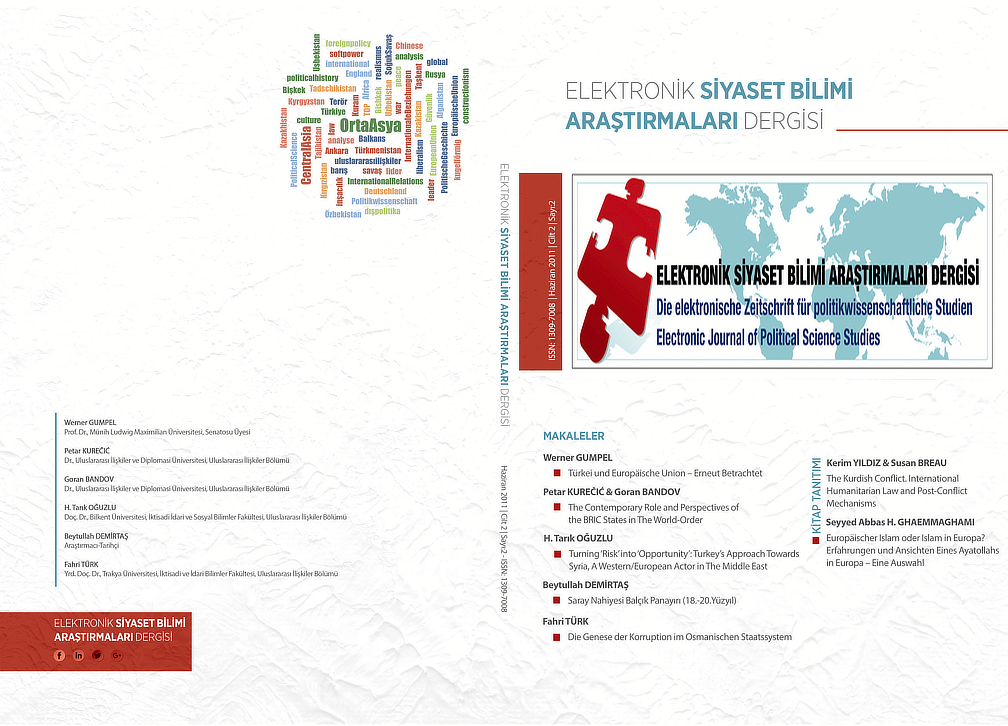INHALT
 | |||
| Artikel | |||
|---|---|---|---|
| Werner GUMPEL Türkei und Europäische Union – erneut betrachtet | 1 | ||
ZusammenfassungObwohl die Türkei, die im Jahr 1995 eine Zollunion mit der EU eingegangen ist, ihrenWillen auf Vollmitgliedschaft immer wieder zum Ausdruck bringt, und eine Reihe vonVorleistungen für diese erbracht hat, lehnen die Regierungen einiger EU-Staaten einen Beitritt des Landes ab. Auch die Mehrheit der Bevölkerung in einigen wichtigen europäischen Staaten, darunter auch in Deutschland, steht einer Aufnahme der Türkei skeptisch gegenüber. In der Türkei selbst weicht die anfängliche Euphorie immer mehr der Skepsis. Der vorliegende Artikel untersucht die Ursachen dieser Entwicklung und die Argumente von Gegnern und Befürwortern eines Beitritts der Türkei zur Europäischen Union und untersucht, ob es für die Türkei wirklich von Schaden wäre, wenn sie außerhalb der Europäischen Union bliebe oder ob ihr dies sogar von Nutzen wäre. Dem wird die aktuelle Europa-Diskussion sowohl in der Türkei als auch in Europa und insbesondere in Deutschland zugrunde gelegt. Schlüsselwörter: Europäischen Union, Türkei, Vollmitgliedschaft, Europa-Diskussion, Deutschland PDF: Türkei und Europäische Union – erneut betrachtet |
|||
| Petar KUREČIĆ; Goran BANDOV The Contemporary Role and Perspectives of the BRIC States in the World-Order | 13 | ||
AbstractThe term ‘BRIC states’ is an acronym derived from the capital letters of the names of four large states: Brazil, Russia, India and China. This group of states represents a relatively new, but powerful and influential group of states in the world order. The contemporary international relations, global and regional, are unimaginable without these states, which are home to over 40 per cent of the world population. BRIC states are changing geo-economics of the world and indicate a gradual and evolutionary deflection of the relative economic power from the most developed states. However, BRIC states are not changing the world economic order quintessentially, since it is defined and ruled by globalisation and the neoliberal ideology. BRIC states are using neoliberal ideology to develop their economies and base their development on the economic growth and the rapidly increasing exploitation of the natural resources. Keywords: BRIC states, geo-economics, world economic order, SWOT analysis PDF File: The Contemporary Role and Perspectives of the BRIC States in the World-Order |
|||
| H. Tarık OĞUZLU Turning ‘Risk’ into ‘Opportunity’: Turkey’s approach towards Syria, A western/European actor in the Middle East | 33 | ||
AbstractThis article discusses the effects of the latest people uprising in Syria on Turkey’s ‘zero problems with neighbors’ foreign policy approach. In this regard, the main argument is that while the developments in Syria have posed strong challenges to Turkey’s decade-long transformative foreign policy understanding, mainly associated with Turkey’s energetic foreign Minister Ahmet Davutoğlu, they equally offer Turkey the opportunity to adopt a more humanitarian and democratic foreign policy stance in this context. The years ahead will increasingly see Turkey putting concerns over democracy and human rights at the center of its foreign policy engagements. This will not only contribute to the improvement of Turkey’s deteriorating relations with the western actors, most notably the European Union, but also be in conformity with the ongoing liberal democratic transformation process underway at home. Keywords: Turkey, Syria, ‘Zero Problems with Neighbors’ Policy, Democracy, Human Rights |
|||
| Beytullah DEMİRTAŞ Saray Nahiyesi Balçık Panayırı (18. - 20. yüzyıl) | 40 | ||
Özet18. ve 19. yüzyıllar ile 20. yüzyıl başlarında panayırlar kalabalık halk topluluklarını bir araya getiren ve genellikle bir hafta süreyle açık olan pazarlardır. Osmanlı Devletinde Anadolu’da ve Rumeli’de panayır geleneği sürdürülmüştür. Saray’da kurulan Balçık Panayırı bunlardan biridir. Balçık Panayırı’nda canlı hayvan ticareti ile çeşitli emtia ve eşya satılmakta idi. Panayırın geliri müzayede yoluyla mültezime veriliyor, mültezimlerden zaman zaman usulsüzlük yapanlar oluyor, merkezî yönetim bunların üzerine giderek halkın ve devletin zarar etmesini önlüyordu. Bu çalışma Osmanlı Devleti’nde 18. ve 20. yüzyıllar arasında kurulan Balçık Panayırının işleyişi vekarşılaşılan sorunlar hakkında bilgi vermeyi amaçlamaktadır. Anahtar Kelimeler: Saray, Balçık Panayırı, Mültezim, Panayır, Osmanlı Devleti PDF Dosyası: Saray Nahiyesi Balçık Panayırı (18. - 20. yüzyıl) |
|||
| Fahri TÜRK Die Genese der Korruption im Osmanischen Staatssystem | 55 | ||
ZusammenfassungIm osmanischen Staatensystem war Ämterverkauf tief verwurzelt gewesen, was für die Verbreitung der Korruption in der türkischen Gesellschaft verantwortlich war Mit Hilfe dieser Praxis versuchte der Staat die Einnahmen zu erhöhen. Bei der Verbreitung der Korruption im türkischen Staatsapparat spielte die Haltung des Sultans Abdülhamid II. eine besondere Rolle, was man aus seinen Erinnerungen entnehmen kann. Vor diesem Hintergrund ist es nicht verwunderlich, dass auch die heutige Türkei in der globalen Korruptionsskala der “Transparency International” ziemlich weit hinten rangiert. Unter den 150 überprüften Ländern belegte sie im Jahre 2008 Platz 58. Schlüsselwörter: Bestechungsgeld, Das Osmanische Reich, Ämterverkauf, II. Abdülhamid PDF: Die Genese der Korruption im Osmanischen Staatssystem |
|||
| Rezensionen | |||
| Kerim YILDIZ; Susan BREAU The Kurdish Conflict. International Humanitarian Law and Post-Conflict Mechanisms | 62 | ||
RezensionYildiz, Kerim; Breau, Susan, 2010: The Kurdish Conflict. International Humanitarian Law and Post-Conflict Mechanisms. 354 S. Routledge. London, New York. ISBN 978-0-415-56273-75. Autor: Askim MÜLLER-BOZKURT |
|||
| Seyyed Abbas Hosseini GHAEMMAGHAMI Europäischer Islam oder Islam in Europa? Erfahrungen und Ansichten eines Ayatollahs in Europa – eine Auswahl | 63 | ||
RezensionGhaemmaghami, Seyyed Abbas Hosseini, 2010: Europäischer Islam oder Islam in Europa? Erfahrungen und Ansichten eines Ayatollahs in Europa – eine Auswahl. 227 S. Verlag Hans Schiller, Budapest. ISBN 978-3-89930-282-0. Autor: Askim MÜLLER-BOZKURT |
|||




